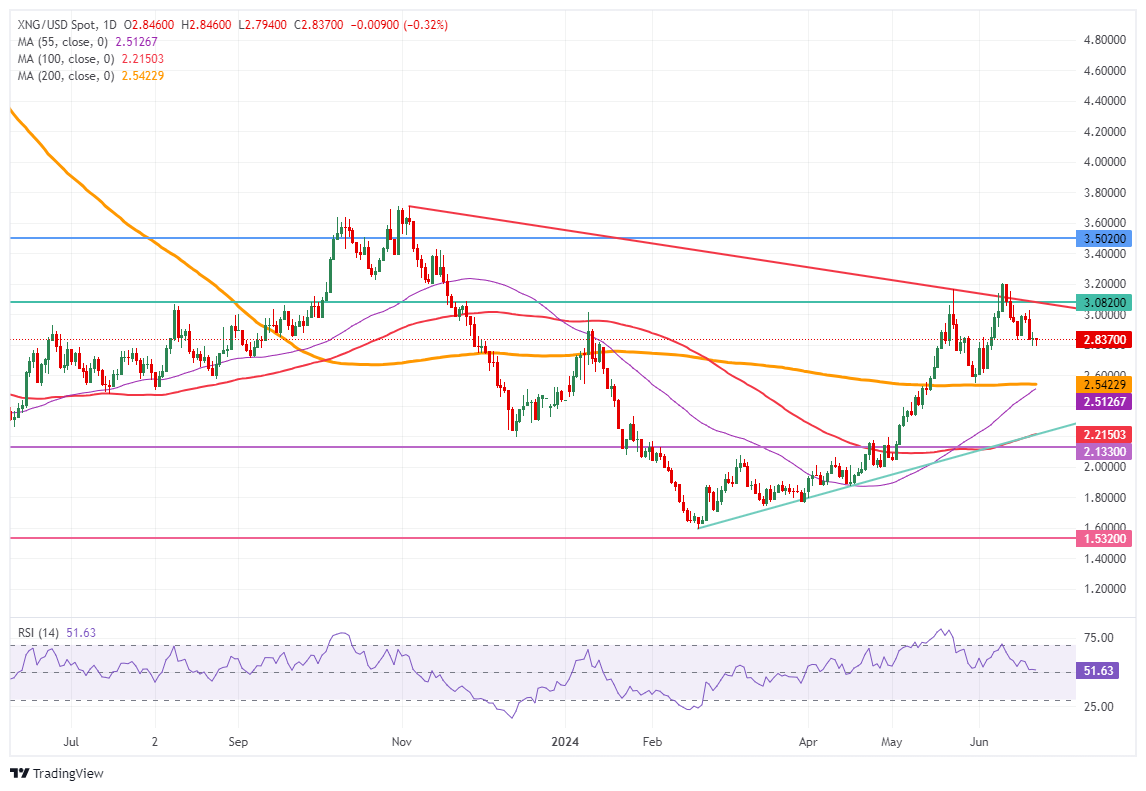- Natural Gas remains stable above $2.80 on Monday, near last week’s support.
- Traders assess another disruption in Norway at the Hammerfest LNG plant.
- The US Dollar Index is trading in the high 105.00 region, although it could face pressure from Yen interventions.
The price of Natural Gas (XNG/USD) trading stable to slightly higher on Monday. Despite last week’s setback, a headline risk is forming again, with Norway having to report an unforeseen outage. This makes it very difficult for Europe to predict whether it will be replenished before the heating seasons, since Gas flows to Europe are very unpredictable.
Meanwhile, the US Dollar Index (DXY), which tracks the value of the dollar against six major currencies, is trading near its June high, where it closed around the end of last week. However, there is a risk of a quick correction as the US Dollar (USD) is close to the feared 160.00 level against the Japanese Yen (JPY), a level where the Japanese government has intervened in the past. The last time the government intervened, the Japanese Yen appreciated more than 5% against the Dollar, with a domino effect on the DXY, which fell almost 2% as a result.
Natural Gas is trading at $2.83 per MMBtu at the time of writing.
News and drivers of the Natural Gas market: Russia on the move
- Russia is passing through the Arctic Sea faster than expected, with the Liquefied Natural Gas (LNG) tanker Eduard Toll passing through the Northern Sea Route. This is the fastest way for Russia to get LNG to Asia.
- Norwegian grid operator Gassco reported an outage at the Hammerfest LNG plant on Monday, according to Bloomberg. Although the outage should be resolved during the day, it again shows how unreliable the current Gas flows from Norway to Europe are.
- Japan is buying Shale Gas in Texas, with Mitsui & Co Limited buying some hectares to dig and drill. The site should be operational by 2026.
Natural Gas Technical Analysis: RSI has cooled
Natural Gas prices have relaxed and could begin to rebound again if the RSI is any guide. With the price near $2.83, the RSI has cooled down after trading at elevated levels and is currently in the middle of the range around 50.00. With these constantly disrupted Gas flows from Norway to Europe, it becomes very difficult to assess whether Europe will see its Gas warehouses filled in time.
The crucial level near $3.08 (6March 2023 high) remains key after its false breakout last week. Additionally, the red descending trend line on the chart below at $3.10 will also weigh on this area as a limiter. Further up, the new year-to-date high at $3.16 is the level to beat.
On the downside, the 200-day SMA acts as the first support near $2.54. If that support area does not hold, the next target could be the crucial level near $2.13, with interim support by the 55-day SMA near $2.51 and the 100-day SMA at $2.21.
Natural Gas: Daily Chart
Natural Gas
The dynamics of supply and demand is a key factor that influences Natural Gas prices, and in turn is influenced by global economic growth, industrial activity, population growth, production levels and inventories. Climate influences Natural Gas prices because more Gas is used during cold winters and hot summers for heating and cooling. Competition from other energy sources influences prices as consumers may opt for cheaper sources. Geopolitical events, such as the war in Ukraine, also play a role. Government policies related to extraction, transportation and environmental issues also influence prices.
The main economic publication that influences Natural Gas prices is the weekly inventory bulletin of the Energy Information Administration (EIA), a US government agency that produces data on the gas market in the United States. The EIA Gas bulletin usually comes out on Thursday at 14:30 GMT, the day after the EIA publishes its weekly Oil bulletin. The economic data of the large consumers of Natural Gas can influence supply and demand, among which China, Germany and Japan stand out. Natural gas is primarily priced and traded in US dollars, so economic releases affecting the US dollar are also factors.
The US dollar is the world’s reserve currency and most commodities, including Natural Gas, are quoted and traded in international markets in US dollars. Therefore, the value of the Dollar influences the price of Natural Gas, since if the Dollar strengthens, fewer dollars are needed to buy the same volume of gas (the price falls), and vice versa if the dollar strengthens.
Source: Fx Street
I am Joshua Winder, a senior-level journalist and editor at World Stock Market. I specialize in covering news related to the stock market and economic trends. With more than 8 years of experience in this field, I have become an expert in financial reporting.








